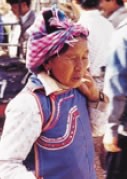Neisu, Da Hei in China

Photo Source:
Copyrighted © 2026
Operation China, Asia Harvest All rights reserved. Used with permission |
Send Joshua Project a map of this people group.
|
| People Name: | Neisu, Da Hei |
| Country: | China |
| 10/40 Window: | Yes |
| Population: | 8,300 |
| World Population: | 8,300 |
| Primary Language: | Nasu, Wusa |
| Primary Religion: | Ethnic Religions |
| Christian Adherents: | 0.00 % |
| Evangelicals: | 0.00 % |
| Scripture: | New Testament |
| Ministry Resources: | Yes |
| Jesus Film: | No |
| Audio Recordings: | Yes |
| People Cluster: | Tibeto-Burman, other |
| Affinity Bloc: | Tibetan-Himalayan Peoples |
| Progress Level: |
|
Introduction / History
Like the Nosu of Sichuan, the Da Hei Neisu have come from a society in which they were the traditional landlords and slave-owners. "Although their counterparts in Sichuan emerged from the slave system as late as the 1950s, this people seem to have begun slowly adopting new ways hundreds of years ago. ... The Da Hei Neisu entered Honghe Prefecture from Luoping and Qiubei counties and from as far away as Zhaotong. That this people migrated from Zhaotong Prefecture lends credence to a possible connection between this and the Liangshan Nosu system of slavery."
Commonly called Da Hei Yi (Big Black Yi) by the Chinese, this people group refers to itself as Neisu or Nasu meaning "black people." Linguist Jamin Pelkey has stated that "when widely different cultures and languages are encountered among one of these 'Black People' groups a clarifying title must be given to distinguish dissimilarities."
What Are Their Lives Like?
Although it is possible that dialects and cultures have diverged between the communities living so far apart, the Da Hei Neisu continue to see themselves as a homogeneous people group. A Da Hei Neisu wedding usually lasts from four to seven days. After marriage it is customary for the new husband and wife to sleep in separate beds. Da Hei Neisu traditional dress has disappeared in most regions, and many customs are also on the decline.
What Are Their Beliefs?
The Da Hei Neisu are polytheistic animists who believe a person's soul leaves the body at death or when the person is sick. To prevent this from happening, they tie string around the wrists of an ill person and fasten it to a bedpost or piece of furniture. Shamans are summoned to call the spirit back into the body.
Although Catholic missionaries from the Paris Foreign Missionary Society worked among the Sani and Axi people in the 1880s, experiencing much success, no record exists of outreach to the Da Hei Neisu people farther south of the French mission stations. Few have any awareness of the name of Jesus Christ. Much prayer is needed to break down the powerful influence of the occult among the Da Hei Neisu.
What Are Their Needs?
Without the guidance of Christ, these people are like sheep without a shepherd. They need the good shepherd in their families and communities.
Prayer Points
Pray for anointed, sent-out workers.
Pray for the Lord to intervene in their families, calling people to his side.
Pray for their hearts to be drawn to the Lord of lords.
Pray for a church planting movement to thrive in their communities.